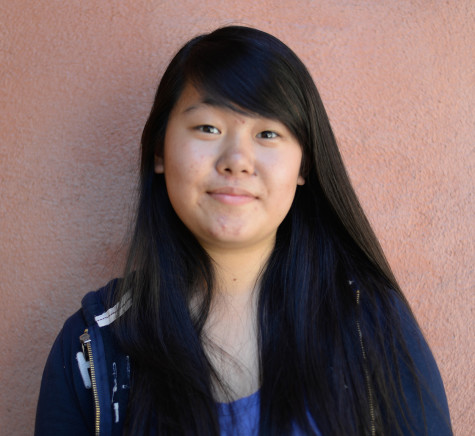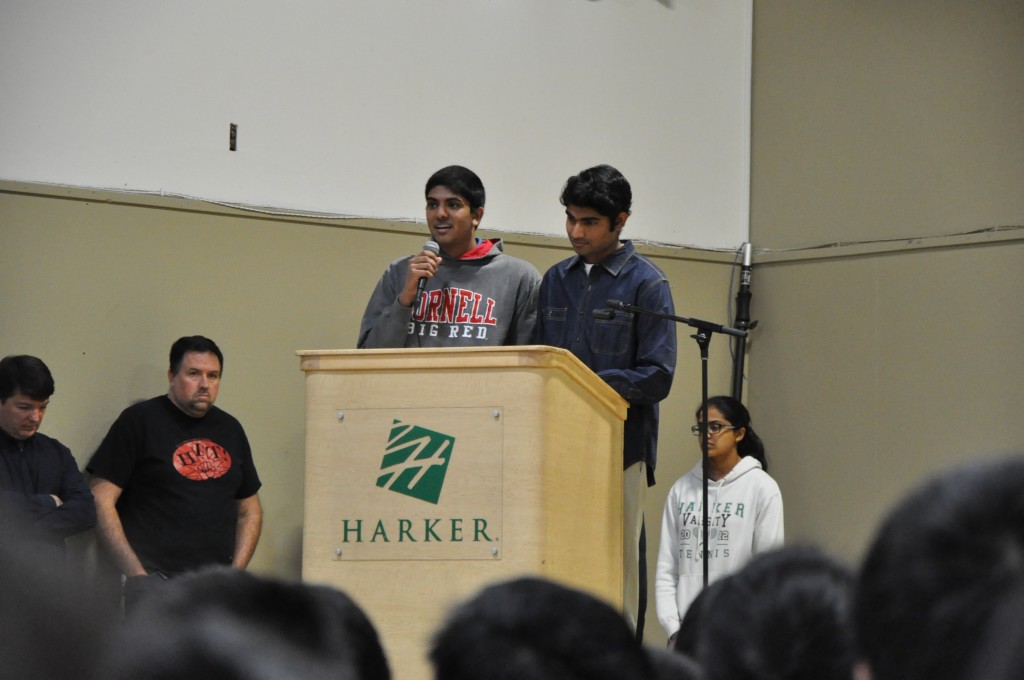New Harker Economics Club announced during school meeting
Co-founders Vamsi Gadiraju (11) and Vedant Thyagaraj (11) announce their new Harker Economics Club at school meeting. The club plans to promote a greater interest in economics within the school community.
Juniors Vamsi Gadiraju and Vedant Thyagaraj announced the launch of the Harker Economics Club at school meeting on Monday, Jan. 27.
Co-founded by Vamsi and Vedant with economics teacher Samuel Lepler as the club advisor, the Harker Economics Club is the first Upper School club to focus solely on economics. While it shares some similarities with DECA, the Economics Club differs in its emphasis on the understanding of economics rather than its business applications.
The club aims to create an interest for economics among the student body, with informative lectures on a variety of topics as well as preparation for contests such as the National Economics Challenge and the Harvard Pre-Collegiate Economics Challenge.
“We plan to have many sessions where we will talk about personal finance, Bitcoin, and other useful real world applications of economics that students can directly participate in or learn in,” Vedant said. “We will also have jeopardy style review sessions to get students prepared for tournaments. We are also aspiring to bring in real economists or specific professors to lecture and educate students about their area of expertise.”
Vamsi and Vedant were inspired to create the Economics Club after noticing there were no post-AP choices for economics students, as both have taken AP Economics at the Upper School. They hoped the Economics Club would allow students who have taken economics to continue pursuing their interests in the subject, especially in topics not studied in classes.
“Most of the material we learn in the class is confined to the strict AP curriculum that is mainly focused on a very neo-Keynesian form of economics education,” Vamsi said. “In the real world, there are many different theories, such as neo-Classical or Chicago School economics, and applications, like virtual currencies or stock indexes, of economics that aren’t even touched upon in the class due to the structure of the AP test.”
In addition, the club would be an opportunity to introduce underclassmen to economics and act as a forum for the discussion of economic issues and current events. Many of the skills learned from economics, such as personal finance, are useful for all students in the future regardless of their career choices.
Lepler, the club advisor, hopes the club will expand in the future to bring prestigious speakers to its meetings or even host a Harker Economics tournament for local Bay Area schools.
“I am very optimistic about our current plans,” Lepler said. “Hopefully we can achieve a level of interest and engagement and get a whole lot done to build excitement among the student body for economics that can also compliment DECA and the Entrepreneurship program.”
The club will have its first meeting this Wednesday in Shah Hall room 403 to go over its plans and goals. All students interested are welcome to attend and learn more about what the club has to offer, regardless of experience or background in economics.

Cindy Liu, Academics Editor for the TALON Yearbook, is a senior and has been on staff for four years. Her favorite part of journalism is being able to...


















![“[Building nerf blasters] became this outlet of creativity for me that hasn't been matched by anything else. The process [of] making a build complete to your desire is such a painstakingly difficult process, but I've had to learn from [the skills needed from] soldering to proper painting. There's so many different options for everything, if you think about it, it exists. The best part is [that] if it doesn't exist, you can build it yourself," Ishaan Parate said.](https://harkeraquila.com/wp-content/uploads/2022/08/DSC_8149-900x604.jpg)




![“When I came into high school, I was ready to be a follower. But DECA was a game changer for me. It helped me overcome my fear of public speaking, and it's played such a major role in who I've become today. To be able to successfully lead a chapter of 150 students, an officer team and be one of the upperclassmen I once really admired is something I'm [really] proud of,” Anvitha Tummala ('21) said.](https://harkeraquila.com/wp-content/uploads/2021/07/Screen-Shot-2021-07-25-at-9.50.05-AM-900x594.png)







![“I think getting up in the morning and having a sense of purpose [is exciting]. I think without a certain amount of drive, life is kind of obsolete and mundane, and I think having that every single day is what makes each day unique and kind of makes life exciting,” Neymika Jain (12) said.](https://harkeraquila.com/wp-content/uploads/2017/06/Screen-Shot-2017-06-03-at-4.54.16-PM.png)








![“My slogan is ‘slow feet, don’t eat, and I’m hungry.’ You need to run fast to get where you are–you aren't going to get those championships if you aren't fast,” Angel Cervantes (12) said. “I want to do well in school on my tests and in track and win championships for my team. I live by that, [and] I can do that anywhere: in the classroom or on the field.”](https://harkeraquila.com/wp-content/uploads/2018/06/DSC5146-900x601.jpg)
![“[Volleyball has] taught me how to fall correctly, and another thing it taught is that you don’t have to be the best at something to be good at it. If you just hit the ball in a smart way, then it still scores points and you’re good at it. You could be a background player and still make a much bigger impact on the team than you would think,” Anya Gert (’20) said.](https://harkeraquila.com/wp-content/uploads/2020/06/AnnaGert_JinTuan_HoHPhotoEdited-600x900.jpeg)

![“I'm not nearly there yet, but [my confidence has] definitely been getting better since I was pretty shy and timid coming into Harker my freshman year. I know that there's a lot of people that are really confident in what they do, and I really admire them. Everyone's so driven and that has really pushed me to kind of try to find my own place in high school and be more confident,” Alyssa Huang (’20) said.](https://harkeraquila.com/wp-content/uploads/2020/06/AlyssaHuang_EmilyChen_HoHPhoto-900x749.jpeg)



